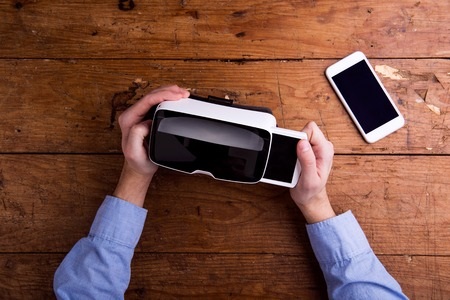Virtual reality is the latest tech fad to sweep the industry: most everyone has at least heard of how immersive an experience it can be.

However, at a fairly steep price for entry, is this something that will ever gain lasting traction with consumers?
And is it something that should be considered for compatibility with your apps?
While this technology currently seems to lend itself more to video gaming, it is only a matter of time before the hardware starts to drop in price and thereby becomes more accessible to a wider market.
When virtual reality is no longer a luxury item but a household staple, its impact will extend far beyond the realm of gaming.
Imagine history lessons where students can walk the halls of ancient Rome or explore the pyramids of Giza. Science classes could offer dissections of the human body or immersive journeys through the solar system.
For those in the medical field, VR could revolutionize training by allowing doctors and nurses to practice complex procedures in a safe, virtual environment. The possibilities for social interaction are equally vast. Imagine reuniting with long-distance family members for holidays or attending concerts with friends across the globe, all from the comfort of your living room. VR has the potential to break down geographical barriers and foster a deeper sense of connection. There are so many possibilities to explore in the future, and we are always ready to face any virtual reality trends.
As the technology penetrates the market more, we think that you will start to see more creative and interesting entertainment experiences.
This snowball effect could help to really push the technology even further, opening the door for more and more content creators to give virtual reality a serious consideration when they are designing their software.
Despite the high cost of VR headsets, skepticism about its future is misplaced. Remember bulky, expensive personal computers? Now they’re everywhere. VR is likely on a similar trajectory. As it becomes more affordable and widespread, expect a surge of creative entertainment experiences.
This will propel VR further, making it a force to be reckoned with in mainstream entertainment. So, will VR gain traction? The answer, considering wider adoption and an explosion of creative content, seems promising.
Do you think virtual reality will ever gain traction in mainstream entertainment?
We want to know your thoughts on the subject.

 With Experience in Quality Assurance & Testing Desktop Software, Mobile Apps, Websites & Web Applications for Nearly 30 Years, Beta Breakers has become the Premier Software Quality Assurance Labs and Application-Testing Provider -
With Experience in Quality Assurance & Testing Desktop Software, Mobile Apps, Websites & Web Applications for Nearly 30 Years, Beta Breakers has become the Premier Software Quality Assurance Labs and Application-Testing Provider - 

Can you be more specific about the content of your article? After reading it, I still have some doubts. Hope you can help me.